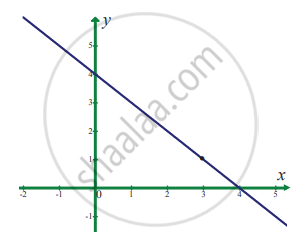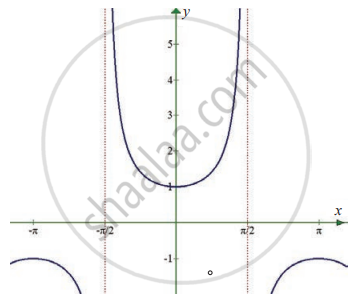Advertisements
Advertisements
प्रश्न
Evaluate the following limits:
`lim_(x -> 0) (tan x - sin x)/x^3`
उत्तर
We know `lim_(x -> 0) sinx/x` = 1
`lim_(x -> 0) (tan x - sin x)/x^3 = lim_(x -> 0) (sinx/cosx - sin x)/x^3`
= `lim_(x -> 0) ((sinx - sinx cosx)/cosx)/x^3`
= `lim_(x -> 0) (sinx(1 - cosx))/(x^3 cosx)`
= `lim_(x -> 0) sinx/x * (2sin^2 (x/2))/(x^2) xx 1/cosx`
= `lim_(x -> 0) sinx/x xx (2sin^2 (x/2))/(2^2 xx x^2/2^2) xx 1/cosx`
= `lim_(x -> 0) sinx/x xx 1/2 (lim_(x/2 -> 0) (sin(x/2))/(x/2))^2 xx lim_(x - 0) 1/cosx`
= `1 xx 1/2 xx 1^2 xx 1/cos0`
= `1/2 xx 1/1`
`lim_(x -> 0) (tan x - sin x)/x^3 = 1/2`
APPEARS IN
संबंधित प्रश्न
Evaluate the following limit:
`lim_(x -> 5)[(x^3 - 125)/(x^5 - 3125)]`
Evaluate the following limit :
If `lim_(x -> 5) [(x^"k" - 5^"k")/(x - 5)]` = 500, find all possible values of k.
In the following example, given ∈ > 0, find a δ > 0 such that whenever, |x – a| < δ, we must have |f(x) – l| < ∈.
`lim_(x -> -3) (3x + 2)` = – 7
In exercise problems 7 – 15, use the graph to find the limits (if it exists). If the limit does not exist, explain why?
`lim_(x -> 3) (4 - x)`
In exercise problems 7 – 15, use the graph to find the limits (if it exists). If the limit does not exist, explain why?
`lim_(x -> 0) sec x`
Evaluate the following limits:
`lim_(sqrt(x) -> 3) (x^2 - 81)/(sqrt(x) - 3)`
Evaluate the following limits:
`lim_("h" -> 0) (sqrt(x + "h") - sqrt(x))/"h", x > 0`
Evaluate the following limits:
`lim_(x -> 2) (1/x - 1/2)/(x - 2)`
Evaluate the following limits:
`lim_(x -> 1) (root(3)(7 + x^3) - sqrt(3 + x^2))/(x - 1)`
Evaluate the following limits:
`lim_(x -> "a") (sqrt(x - "b") - sqrt("a" - "b"))/(x^2 - "a"^2) ("a" > "b")`
Evaluate the following limits:
`lim_(x -> oo) (1 + 3/x)^(x + 2)`
Evaluate the following limits:
`lim_(x -> 0) (3^x - 1)/(sqrt(x + 1) - 1)`
Evaluate the following limits:
`lim_(x -> ) (sinx(1 - cosx))/x^3`
Choose the correct alternative:
`lim_(x -> 0) (8^x - 4x - 2^x + 1^x)/x^2` =
Choose the correct alternative:
If `lim_(x -> 0) (sin "p"x)/(tan 3x)` = 4, then the value of p is
Choose the correct alternative:
`lim_(x -> 0) ("e"^(sin x) - 1)/x` =
Choose the correct alternative:
The value of `lim_(x -> 0) sinx/sqrt(x^2)` is
